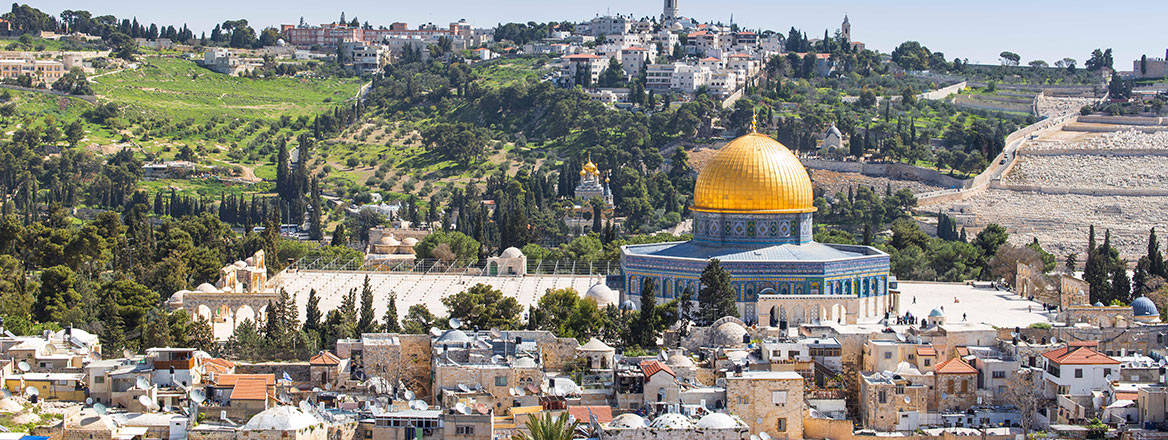Israelis and Palestinians Have Never Sounded So Alike Yet Been So Far Apart
Israeli and Palestinian communities are currently traumatised, distrustful and defiant, with polls showing support for a two-state solution at an all-time low. Many in both communities feel that a peace process would simply allow the other side to buy time while pursuing more maximalist goals.
If you mention a peace process in Israel or the West Bank these days, you risk sounding naive at best and borderline treacherous at worst. Both communities are reeling, polls show support for a two-state solution is at an all-time low, and the Israeli Knesset has just passed a resolution rejecting a Palestinian state.
But the conflict isn’t going away and, at some point, engagement will again be necessary. When that time comes, the parameters cannot just snap back to the same issues that defined previous negotiations. Rather, they will need to take into account the sharply changed realities (and strikingly similar perceptions) in both communities. In my conversations with everyday Israelis and Palestinians on the ground, the same themes keep emerging – yet it’s clear that the two communities have never been further apart.
Trauma
Both Israelis and Palestinians are (again) navigating unprecedented traumas, and ‘trauma’ is the word I’ve heard the most here this summer. The Israel–Palestine conflict has long been described as one of dual victimhood, with the state of Israel emerging in the aftermath of the Holocaust, along with the mass displacement of indigenous Palestinians in the Nakba, or ‘catastrophe’. The intergenerational trauma of those events still deeply pervades both societies, but the events themselves are recognised as historical events that predate the lives of most members of both populations.
The 7 October attacks and the subsequent war in Gaza have brought those prior traumas surging back for the current generation. For Israel, 7 October not only marked the single deadliest day for Jews since the Holocaust, but also reanimated a sense of existential dread not felt in decades. Several people have told me that their overwhelming thought on the morning of the attacks was: ‘They are coming for us’.
The war in Gaza, meanwhile, is being experienced by Palestinians as the current generation’s Nakba: ‘What our grandparents experienced in 1948, it’s history. But what is going on now in Gaza is so shocking, because for us, it's the first time to see this level of destruction, of ethnic cleansing, of mass killings’, one woman told me.
As much as Israelis and Palestinians distrust their own leaders, they also distrust the other side’s, including the relative moderates who would be most likely to re-engage in a future peace process
Not only are the twin traumas unfolding simultaneously, but each side has shrugged off the other’s suffering with a general response of ‘they deserved it’. ‘Even Palestinians who don’t support Hamas couldn’t help feeling a satisfaction on 7 October’, I’ve heard often, with polling reflecting the same sentiment. And most Israelis, across the political spectrum, support the war in Gaza. As one man told me, ‘There is a Jewish saying: if there are those who are coming to kill you, you kill them first. So what can we do?’
Distrust
‘Corrupt’. ‘Complicit’. ‘Selfish’. ‘Liars’. I haven’t met a single Israeli or Palestinian who trusts their current leadership – much less the other side’s.
More than half of Israelis believe that Prime Minister Benjamin Netanyahu is prolonging the war for political reasons, and citizens across the ideological spectrum blame him for the failed policies and security lapses that, they believe, allowed the Hamas attacks to take place.
Palestinians are equally frustrated with the ossifying Palestinian Authority (PA), which has long been seen as corrupt. But for most Palestinians I’ve spoken with, it is what they view as the PA’s complicity with Israel, via intelligence and security cooperation, that has most degraded any sense they might have of the body’s legitimacy. As one activist told me:
'People feel oppressed, we don’t have the power of political parties, and we feel we cannot do what we should do to support Gaza. Everywhere around the world, we see actions in solidarity with Gaza, or for a ceasefire. But here we cannot write a Facebook post, we cannot organise demonstrations or sit-ins, even within our own cities.'
As much as Israelis and Palestinians distrust their own leaders, they also distrust the other side’s, including the relative moderates who would be most likely to re-engage in a future peace process. Moreover, they distrust a peace process, believing such a process does little beyond allowing the other side to buy time while pursuing more maximalist goals.
An open letter published by Palestinians in Mondoweiss put it bluntly: ‘Make no mistake. The offers of a Palestinian state are an illusion’. Israelis I have met expressed similar views: ‘No matter what [PA president] Abu Mazen says, or a piece of paper says, most Palestinians will still just want to kill Jews. And they won’t stop, even if there is a Palestinian state’.
Isolation
Both Palestinians and Israelis feel wholly marginalised by the international community. Despite sympathy from world leaders directly after 7 October, Israelis have since perceived a world turned increasingly hostile, from widespread student protests and unexpected boycotts to legal actions in the International Court of Justice (ICJ) and the International Criminal Court (ICC). ‘It’s like the whole world has forgotten the atrocities of 7 October’, I’m often told.
There are also more pointed criticisms. A former IDF spokesperson I met was incredulous that the World Health Organization had not condemned Hamas’s infiltration of Gazan hospitals. In Tel Aviv, a main thoroughfare is lined with posters accusing UN Women of ignoring reports of widespread sexual violence on 7 October. When I asked women at the Hostages and Missing Persons Square why they thought that was, their answer was simple: ‘Because we’re Jews’.
Palestinians have felt equally marginalised. While international solidarity protests for Palestine are appreciated, there is frustration that government leaders, especially in the US, have continued to support Israel: ‘How can they just sit back and let a genocide continue for nine months?’
Even the ICJ and ICC actions, while welcome, are seen by many Palestinians as double-edged swords, because of the lack of enforcement mechanisms. ‘On the one hand, the legal steps make people hope that justice might prevail’, a Palestinian human rights lawyer told me. ‘At the same time, when nothing happens after that, and the end result on the ground is nothing, people lose faith, not just in the court, but in the whole international system’.
Defiance
Both sides are also more dug in than ever before – and confident that they can wait each other out. The phrase ‘from the river to the sea’ became well-known for its deployment in pro-Palestine demonstrations, but I hear it invoked by Israelis just as much as by Palestinians – referring to full control of the land between the Mediterranean Sea and the Jordan River, including the West Bank.
Despite sympathy from world leaders directly after 7 October, Israelis have since perceived a world turned increasingly hostile, from widespread student protests and unexpected boycotts to legal actions in international courts
Such aspirations are not new, but they are more widespread and vocalised now than in previous years. Moreover, both sides are increasingly convinced that they can win in a long-game demographic stand-off. Palestinians have long embraced the concept of sumoud, roughly translated as ‘steadfastness’, or a sense of perseverance and rootedness in the land. I’m often told, ‘We outlasted the British and the Ottomans and centuries of other foreign occupiers. We can outlast Israel too’. Among Israelis, the word I’ve heard the most in the post-7 October context is ‘resilience’. Despite some reports of emigration in the context of the war, the main sentiment here was summed up by one Israeli as, ‘We’re not moving. We are resilient and we won’t be bullied anymore’.
Extremists have, obviously, exploited those sentiments further. Far-right Israeli settlers, intent on retaking all of biblical Israel, have escalated campaigns of direct violence to expel Palestinians from more than a dozen West Bank villages since 7 October, attacks described to me by multiple Palestinians as ‘pogroms’. And many Palestinians support Hamas’s claim that the 7 October attack was ‘a necessary step and a normal response to confront all Israeli conspiracies against the Palestinian people’.
There are, of course, still many individuals, NGOs and movements – including family members of hostages and victims – who are committed to a (fledgling) peace movement. As one activist said, ‘Everyone wants things black and white, but as humans, we should be able to have empathy for the hostages and their families and also for civilians in Gaza. People want revenge, and it’s understandable, but we cannot lose our identity and our humanity in search of revenge’.
But most mainstream Israelis and Palestinians I’ve met do not see their hardened positions as motivated by revenge, so much as by survival. A new political vision, whenever it comes, will need to engage with these deeper fundamental realities if it’s going to stand a chance.
The views expressed in this Commentary are the author’s, and do not represent those of RUSI or any other institution.
Have an idea for a Commentary you’d like to write for us? Send a short pitch to commentaries@rusi.org and we’ll get back to you if it fits into our research interests. Full guidelines for contributors can be found here.
WRITTEN BY
Dr Julie Norman
RUSI Senior Associate Fellow, International Security
- Jim McLeanMedia Relations Manager+44 (0)7917 373 069JimMc@rusi.org



